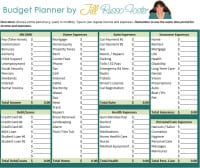Getting your finances ready for the upcoming holiday season. With two months left to the year and all the news reports to shop now, what can you do?
First let’s start with your list. Who are you planning on making purchases for? 
Next, let’s take a look at your budget. How much do you have saved? How much can you afford to spend? Remember that the season typically includes more than gifts. You may have opportunities to attend gatherings, participate in events, and more. Don’t forget to include this in your budget too.
How is it looking? Are you all set and ready to shop? Or do you need to tweak your plan?
Some of the things we have done to reduce our spending is to cut back on gift giving, give one family gift as opposed to individual gifts and have get togethers instead of gifts. Take your list and think outside the box for what is right for you.
This is not the time to open a new credit card account, because you can get a discount. This is will lower your credit score with a new inquiry and new credit line. Probably not in your best interest. Plus, you don’t want to start off 2022 with holiday debt added to your budget.
Make a plan and decide what is right for you and enjoy the holidays.
 Ever wonder what budgeting app is best for you and your family? Not sure where to start? I am asked this all the time and I don’t have a recommendation for you. I still use a manual method and am happy with that for us.
Ever wonder what budgeting app is best for you and your family? Not sure where to start? I am asked this all the time and I don’t have a recommendation for you. I still use a manual method and am happy with that for us. Weddings are an emotional celebration. We love the idea of a bride and groom starting a new life together. We use words like “two becoming one” or “sharing your lives as one,” meaning that everything will be shared as though the couple are no longer individuals. I believe this puts a lot of unnecessary sentimental pressure on a couple to share all their finances even though it’s not always necessary, or even wise, to do so for every single account or property.
Weddings are an emotional celebration. We love the idea of a bride and groom starting a new life together. We use words like “two becoming one” or “sharing your lives as one,” meaning that everything will be shared as though the couple are no longer individuals. I believe this puts a lot of unnecessary sentimental pressure on a couple to share all their finances even though it’s not always necessary, or even wise, to do so for every single account or property. , we’ve had some warm days and some bitter cold days. But spring is coming!
, we’ve had some warm days and some bitter cold days. But spring is coming!
 y people’s minds.
y people’s minds.
 ad to change.
ad to change. ink popsicle molds, how many times have I used them. I can only think of one time. We are working our way through the cabinets and drawers in our home. How many of these items do you have in your home?
ink popsicle molds, how many times have I used them. I can only think of one time. We are working our way through the cabinets and drawers in our home. How many of these items do you have in your home?